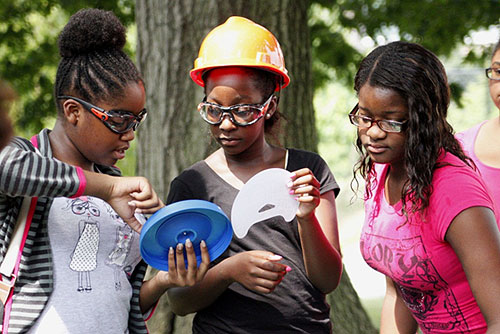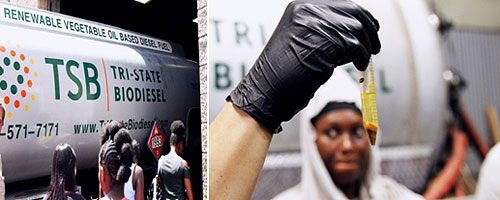| Return
to STEP In the News
Bronx Community College
Summer STEP
Summer 2013 @ Bronx Community College

Students were introduced to the Center for Sustainability
and the on-campus solar lab with instructor Kim Curran. They
learned sun patterns affect the world differently—more
sunlight is available longer near the equator and during the
summer. They learned how to use solar pathfinders to identify
the best placement for solar panels.
The summer of 2013 was a two pronged scientific exploration.
One of the foci of this summer’s STEP program was “Sustainable
Energy.” The students began by exploring the concepts
of sustainability, to understand the personal and global need
for sustainable energy. We also took time to explore the definition
of energy, from the tangible to theoretical. We introduced
the basic science behind the carbon cycle and fossil fuel
consumption. They identified the primary sources for energy
in our current system—coal, oil, and natural gas, explored
how the use of these fuels is contributing to climate change
through the destruction of the Ozone. The students charted
the concept of Peak Oil, and learned about current renewable
energy options, including solar, hydro, wind, biodiesel and
geothermal.
At the root of all of these patterns is energy, and the
goal was to personalize our understanding of energy consumption,
not leave it in realm of adults and policy makers.

Digging even deeper into the concepts of recycling, students
were introduced to the idea of recycling used cooking oil
to replace the use of fossil fuels in heating and powering
vehicles. They visited TriState Biodiesel and received an
orientation to the business, from recruiting restaurants to
participate, generating sales to local buildings and truck
companies, the trucks that are used to collect the vegetable
oil, the vats that are used to store them, and the process
of filtering and purifying for effective reuse. Students learned
that the City is currently requiring heating fuel to have
a 2% biodiesel content, but that even cold climates like NYC
can replace petro-heating oil with up to 80% biodiesel.
At the root of all of these patterns is energy, and the goal
was to personalize our understanding of energy consumption,
not leave it in realm of adults and policy makers. Students
learned to do a cost-benefit analysis of personal choices,
including externalities not always included in the cost of
a product. Students did a role play as a business person tasked
with making decisions about the disposal of toxic byproducts
from their business, identifying the costs accrued by the
community and the earth that may not be reflected in a simple
analysis of material costs. Finally the concept of Environmental
Justice, and the current inequality in access to natural resources
and environmental protection were explored, particularly in
reference to the Bronx, race and class.
BCC STEP Bioinformatics Summer 2013 Workshop
The 2013 summer bioinformatics workshop for STEP students
was conducted at Bronx Community College (BCC) by Dr. T. Brennan
and Ms. N. Roman in collaboration with the Harlem Children
Society. Twenty-four high school students completed the six
week workshop which incorporates research-based curriculum
materials developed by the Biological Sciences Curriculum
Study (BSCS: www.bscs.org). The high school students are introduced
to major concepts related to genetic variation. This Human
Genetics Variation module focuses on current progress in analyzing
human genetic variation and the impact of that analysis on
individuals and society. After completing the lessons of this
module, students are prepared to take the lessons in the Bioinformatics
module, which demonstrates how computers can be used to extract
useful information from the sequence data of the billions
of base pairs of DNA for the human genome. The BSCS modules
are computer interactive and designed to engage students through
inquiry-based activities. Following completion of the two
modules student workshop participants chose research topics
related to genetic based diseases and prepare research papers,
PowerPoint presentations, and project posters. Several BCC
science majors with good computer skills and experienced as
tutors and research assistants were enlisted to serve as workshop
leaders. They assist in the preparation of workshop materials,
laboratory setup, and presentations, and help students with
computer applications and report and poster preparations.
Source: Bronx
Community College STEP
|

